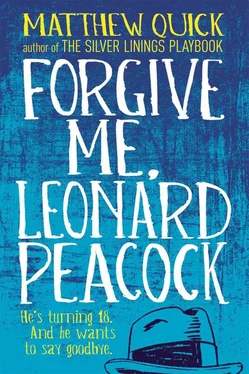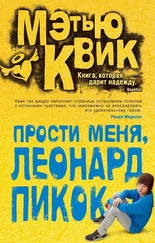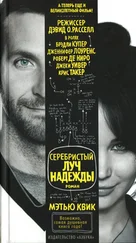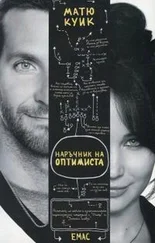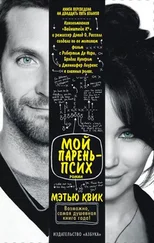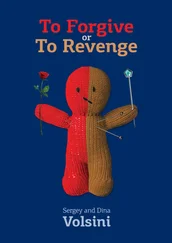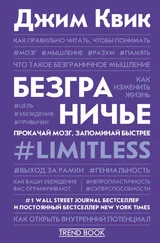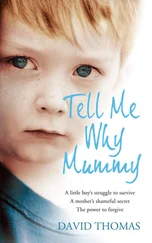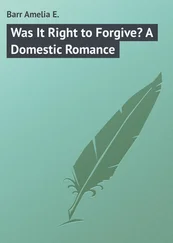But Walt doesn’t play along this time. He gets real twitchy and nervous and then he starts asking me why I gave him the hat at this particular juncture—“Why today? ”—and—“Why do you look so sad all of a sudden?”—and—“What’s wrong?”
Then he starts asking me to take off my hat, asking if I cut my hair, and when I don’t answer he asks me if I’ve talked to my mother today—if she’s been around lately.
I say, “I really have to go to school now. You’re a fantastic neighbor, Walt. Really. Almost like a father to me. No need to worry.”
I’m fighting the big-time tears again, so I turn my back on him and walk out through the smoky hallway, under the crystal chandelier, out of Walt’s life forever.
The whole time he yells, “Leonard. Leonard, wait! Let’s talk. I’m really worried about you. What’s going on? Why don’t you stay awhile? Please. Take a day off. We can watch a Bogie movie. Things will seem better. Bogart always—”
I open the front door and pause long enough to hear him coughing and hacking as he tries to chase me, using his sad drugstore tennis-ball walker.
He could die today , I think, he really could .
And then I just stride out of his house knowing that it was the perfect way to say good-bye to Walt. My storming out right at that very moment was like the emotional climax of an old-school Bogart film. In my mind, I could even hear the stringed instruments building to a dramatic crescendo.
“Good-bye, Walt,” I say as I stride toward my high school.
SIX
LETTER FROM THE FUTURE NUMBER 1
Dear First Lieutenant Leonard,
Billy Penn is doing his best Jesus imitation.
That’s what you’ll say today when you get here and report for duty.
That’ll be in about twenty years and one hour from where you are in the present moment, roughly thirteen months after you decide to risk entering into the great, open, no-longer-civilized void.
Like me, you’ll decide that life on crowded, premium dry land—where you have to elbow everyone out of the way just for a breath of fresh air—is not for you.
And you would never live like a rodent in tube city, now would you?
Inevitably, you’ll come join me in what we now call Outpost 37, Lighthouse 1—what you currently know as Philadelphia, the Comcast Center skyscraper.
These days, tides rise and fall by hundreds of feet due to the increased speeds of weather patterns and the daily earthquakes that open and close gigantic underwater crevasses. Our planet is re-forming.
Today the water is so low, we can see Billy Penn’s feet and just a few inches of the old City Hall building atop of which he is still perched. City Hall is under the sea so it looks like Billy Penn’s walking on water, hence your Jesus reference.
Greetings from the future.
The year is 2032.
There’s been a nuclear holocaust, just like everyone feared there would be, and we’ve managed to melt the polar ice caps, which flooded the planet, covering a third of all known land with sea. Remember that movie your science teacher showed you? Well, Al Gore was right.
The nukes wiped out a fourth of the world’s population, and a food shortage from lack of land and fresh water took care of another fourth, or so they say.
Here in the North American Land Collective—we merged with Canada and Mexico several years ago—our overall losses weren’t as dramatic as in other parts of the world, but our land loss was just as great. This resulted in what has been compared to a migratory heart attack. Everyone was forced into the middle of our country, which caused chaos, of course, and required military law and a new sort of totalitarian government.
They’ve started to build vertically. Sky is the new frontier, the hot real estate. It’s all elevators and skyscrapers and enclosed tubeways in the clouds. People mostly live their lives indoors, somewhere between the earth and outer space, hardly ever breathing unfiltered air or feeling direct sunlight on their bare skin. They’re like gerbils in plastic-tubing cage cities.
But not us.
We have volunteered to man Outpost 37, Lighthouse 1, and we spend most of our days boating around the tops of what was once the Philadelphia skyline. Including you, there are only four of us here.
It is our job to provide light for any vessels that might accidentally find their way into our sector, so they will not crash into the exposed tops of underwater skyscrapers. We are to aid in military operations, of course, but we have not seen another human or a single boat of any kind in more than a year. We have not been officially contacted by the North American Land Collective government in ninety-seven days, nor have we been able to make our satellite links, which leads us to believe that all global communications have been shut down.
Why?
We don’t know.
But here’s the kicker: We do not care.
We are happy.
We are self-sufficient, stocked with twenty more years’ worth of poly-frozen food packets.
Scientists have proved that being exposed to so much unfiltered air, being closer to the great nuclear fallout clouds that drift aimlessly across Global Common Area Two, or what you call the Atlantic Ocean, will definitely shorten our lives quicker than smoking two packs of cigarettes a day, and yet we are at peace with our position and feel as though we have escaped—or maybe like we have finally arrived home.
We’re living in the moment.
Sometimes we feel guilty knowing that so many people have suffered through the horrors that put us here, but as we had no control over those things, we simply try to enjoy our good fortune.
Our life is strange.
We spend our days in the boats searching the tops of skyscrapers for anything interesting, entering apartments and offices and stores as amateur archaeologists. These are the Egyptian pyramids of our time—“our underwater Machu Picchu,” you like to say.
You excavate more with the others, “reconstructing the lives of strangers.” It’s like a game. “Our greatest form of entertainment.” The three of you love to play Who Lived Here? and your answers are full of heroes and heroines who once did brave and noble deeds back before the sea swallowed up their entire civilization.
There are a trillion stories to be found beneath us. “Outpost 37 is perhaps the greatest interactive fiction library man has ever known.”
You said that, by the way.
I’m always quoting the future you.
You’re quite quotable.
You also love spotting dolphins. There is a large school of them here. They’ve begun to mutate due to the nuclear fallout and are slightly larger than they used to be. You often ride on their backs and call them buses. “I’m going to catch a bus,” you’ll say to S and she’ll clap and laugh as you hop onto one, holding the fin, being sprayed by the creature’s breath. We treat them like pets, swim with them often, and cut off the red squidlike parasites whenever the dolphins roll and offer up their smooth white bellies.
One youngster swims alongside your boat every morning when you make rounds. You named him Horatio, because he’s so loyal. We joke about him being your best friend and call you Hamlet, a play you are still reading nightly after all these years. “It gives and gives,” you say. Just like your high school English teacher told you.
But your favorite thing to do is scuba diving down into the city, exploring the watery streets that are still full of cars and hot dog stands and monuments and park benches and petrified trees and sports complexes and so many other things from our past, your present.
We only have so many bottles of oxygen in storage, so you don’t get to go as often as you’d like, because you are saving a few for the future. Rationing. You believe in the future now. It’s easy for you, because you love the present. Also, because you have S now.
Читать дальше
